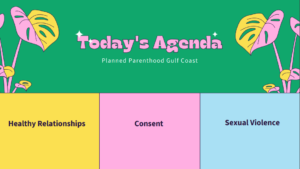
My 3rd Semester With Planned Parenthood Gulf Coast by Sophie Sanchez
This summer, I started my third semester as a Public Affairs intern at Planned Parenthood Gulf Coast. During the academic year, most of my work is conducted on campus, so this summer I shifted to work in the greater New Orleans community. I had the opportunity to shadow a colleague in the Education department for a few sessions in topics regarding sexual health. After shadowing the Education department, I was able to do my first session with Planned Parenthood Teen Geaux, where I developed and presented Advocacy 101. My first challenge was finding opportunities for audience engagement, especially when some education sessions had to be online.
After that, I moved on to making a more intensive education session about Consent, Healthy Relationships, and Sexual Violence Prevention and Response. I utilized my knowledge from the campus organization SAPHE (Sexual Aggression Peer Hotline and Education) trainings, along with my Planned Parenthood experience to develop the session’s curriculum. While it was initially challenging to make my own subject matter from scratch, it became much easier as I started to feel entrenched in the project.
One of the elements of the education session was a ‘Healthy, Unhealthy, or Abusive?’ activity. After explaining the characteristics and distinctions between healthy, unhealthy, and abusive relationships, I gave the audience a relationship scenario. For example, “Eric and Robert have entered a romantic relationship. While Eric seems happy, friends notice that Robert controls their finances and Eric does not have access to any credit cards or their account passwords.” I would ask the participants to explain why the relationship is healthy, unhealthy, or abusive. In this scenario, I was looking for “unhealthy” or “abusive,” because this scenario exhibits a form of financial abuse, which can be described as when one intimate partner has control over the other’s finances, diminishing the partner’s ability to support themselves and forces them to depend on the perpetrator financially. I would accept either response because the information provided is scarce, but Robert is clearly exhibiting a warning sign that can be associated with abuse.
I enjoyed making this education session for participants because it gave me the opportunity to express creativity while educating and engaging with my community. Overall, I think I grew as a health educator and an organizer this summer, and I can’t wait to get back to doing the work on campus as well!
